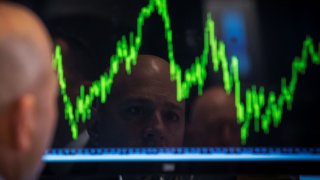
- The volatility index, also known as the VIX, essentially takes a reading of the stock market's blood pressure, measuring investors' fear.
- The VIX can spike when investor concerns are heightened by events like the raising of interest rates by the Federal Reserve or the Covid-19 pandemic.
- Investors can use the VIX to help them make buying and selling decisions.
The volatility index, also known as the VIX, essentially takes a reading of the stock market's blood pressure, measuring investors' fear.
The VIX can spike when investor concerns are heightened by events like the raising of interest rates by the Federal Reserve or the Covid-19 pandemic.
"It's just a unique tool that we can actually quantify that [concern]," Lindsey Bell, chief markets and money strategist at Ally Financial, told CNBC.
Feeling out of the loop? We'll catch you up on the Chicago news you need to know. Sign up for the weekly Chicago Catch-Up newsletter here.
The VIX is a forward-looking index that weighs volatility based on trading in S&P 500 options.
"It's measuring implied volatility over the next 30 days, and that's derived from option activity," said Jason Snipe, founder and chief investment officer at Odyssey Capital Advisors. "That's the catalyst for what moves [the VIX] in either direction."
Investors can use the VIX to help them make buying and selling decisions, or they can indirectly invest in it.
Money Report
"The most important thing is having a plan for whatever you are investing for, whether you are a trader or an investor," said Tiffany McGhee, chief investment officer and CEO of Pivotal Advisors.
Watch the video above to learn more about how the VIX measures fear, the mechanics behind implied volatility and why it matters to investor portfolios.
SIGN UP: Money 101 is an 8-week learning course to financial freedom, delivered weekly to your inbox. For the Spanish version Dinero 101, click here.
CHECK OUT: The 'old convention' for saving in retirement won't work anymore, expert says: Here's how to shift your strategy with Acorns+CNBC
Disclosure: NBCUniversal and Comcast Ventures are investors in Acorns.






